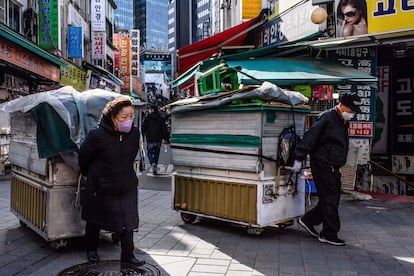South Korea yields on extended 69-hour working week after backlash from young workers
The president has asked government officials to pay more attention to the concerns of employees who say it would further hurt work-life balance in a country known for its workaholic culture

The government of South Korea has been forced to reconsider a proposal to raise the cap on weekly working hours to 69, due to widespread rejection by young people, who say the measure would prevent them from striking a work-life balance and could put their health at risk. According to The Korea Herald, the plan presented at the beginning of the month had been approved by the large South Korean business groups because it “offered a solution to the difficulties in meeting deadlines.” In a country known for its workaholic culture, growing citizen discontent led President Yoon Suk-yeol to state that he considers a work week that exceeds 60 hours “excessive.” He also called for adjustments to “protect the rights and interests of less privileged workers,” as reported on Thursday by the presidential office.
The Ministry of Employment and Labor had announced on March 6 that it intended to raise the current ceiling of 52 weekly hours to allow employers to count overtime on a monthly, quarterly and annual basis, so that workers could manage their schedules based on their workload. In this way, they would be given the option of working up to 69 hours a week in busy periods, in exchange for taking more time off at other times. Since 2018, South Korea has allowed up to 40 regular working hours and week plus 12 more of weekly overtime, and companies found to be in breach of that rule may face sanctions.
The bill has been strongly opposed by workers under 40, who fear the reform will force them to work even more overtime and prevent them from finding work-life balance. Although the proposal intends to force employers to compensate for excess work in periods of inactivity, in practice, many doubt that they would be able to enjoy extended leaves. According to a government survey cited by the Financial Times, in 2020, only 40% of South Korean companies’ employees took all their annual vacations.
Lowest fertility rate in the world
In an attempt to downplay concerns about work-life balance and health, the Labor Ministry said that this “flexible system” offered more options. “We can solve serious social problems, such as the rapid population aging and the low birth rate, by allowing women to choose their work hours more flexibly,” said Minister Lee Jung-sik at the plan’s presentation. South Korea’s fertility rate (or the average number of children expected per woman) fell to 0.78 in 2022, the lowest figure in the world, and has been declining since it fell to 2.1 in 1984.
President Yoon himself on Tuesday gave orders to reassess the measures because they “do not reflect the voices of younger workers.” The South Korean president asked government agencies “to better convey the proposal to citizens, especially Millennials and Generation Z [those born between the 1980s and 2010s],” according to his media chief Kim Eun-hye. The labor minister met on Wednesday with union representatives and said he “was open to all possibilities of change.”
Manufacturing, IT and construction firms had called for more flexibility in working hours, citing staff shortages and difficulties meeting deadlines. While business circles such as the Federation of South Korean Enterprises stressed that the project will benefit the industry’s competitiveness and contribute to job creation, the Association of South Korean Trade Unions lashed out at the government’s plan, calling it “toxic” and “anachronistic” for “forcing workers to put in ultra-long intensive hours.” The so-called Miracle on the Han River, as the country’s rapid development after the Korean War (1950-1953) is known, was achieved largely thanks to this culture of excessive work. South Korea is now the world’s 10th largest economy, but long working hours have discouraged many young people from starting a family.
South Koreans worked an average of 1,915 hours per year in 2021, 199 hours more than the average of the member countries of the Organization for Economic Cooperation and Development (OECD), behind Mexico, Costa Rica, Colombia and Chile.
The government plan has also been criticized for not being up to par with other major economies such as Britain, where many companies last year tried establishing a four-day work week, a system that dozens of activists say resulted in a similar or higher productivity and greater staff well-being.
Sign up for our weekly newsletter to get more English-language news coverage from EL PAÍS USA Edition
Tu suscripción se está usando en otro dispositivo
¿Quieres añadir otro usuario a tu suscripción?
Si continúas leyendo en este dispositivo, no se podrá leer en el otro.
FlechaTu suscripción se está usando en otro dispositivo y solo puedes acceder a EL PAÍS desde un dispositivo a la vez.
Si quieres compartir tu cuenta, cambia tu suscripción a la modalidad Premium, así podrás añadir otro usuario. Cada uno accederá con su propia cuenta de email, lo que os permitirá personalizar vuestra experiencia en EL PAÍS.
¿Tienes una suscripción de empresa? Accede aquí para contratar más cuentas.
En el caso de no saber quién está usando tu cuenta, te recomendamos cambiar tu contraseña aquí.
Si decides continuar compartiendo tu cuenta, este mensaje se mostrará en tu dispositivo y en el de la otra persona que está usando tu cuenta de forma indefinida, afectando a tu experiencia de lectura. Puedes consultar aquí los términos y condiciones de la suscripción digital.









































